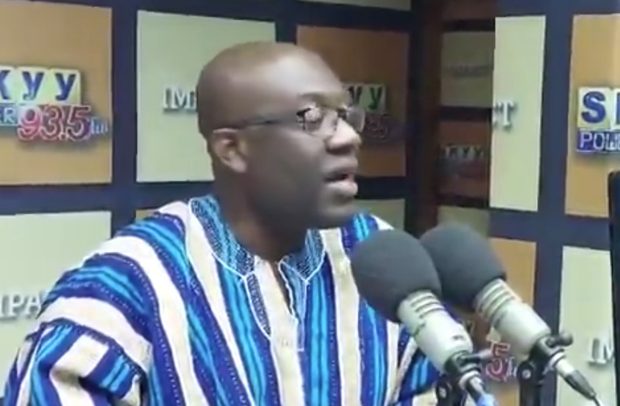Kojo Oppong Nkrumah
Information Minister, Kojo Oppong Nkrumah, has said there is no way anybody can hold the view that the situation where criticisms are not tolerated by the government, popularly called ‘Culture of Silence’, is happening in the country.
He said every citizen has been able to speak his or her mind freely without any hindrance and the media has been operating freely as well.
“This claim that there is something called the Culture of Silence in this country cannot be true,” he said at Nalerigu, at the commencement of his tour of the five northern regions on Wednesday.
Real Silence
In recent times, there have been claims that the ‘Culture of Silence’ which prevailed during military dictatorship in the 1980s when the Provisional National Defence Council (PNDC) which metamorphosed into National Democratic Congress (NDC) when Ghana returned to constitutional rule, reigned.
At the time, there was the criminalisation of free speech, until 2001 when then President J.A. Kufuor through his then Attorney General and now President Nana Akufo-Addo, repealed the obnoxious Criminal Libel through Parliament amid stiff opposition.
“This is a country of about 500 radio stations, about 100 TV stations, millions of social media accounts and everybody is freely expressing themselves. What some persons cannot stand is that when they express their thoughts and other people speak that they disagree, then they claim you are silencing them. Respectfully, that is the beauty of our democracy, that I will have my say, and you can disagree with me,” the Information Minister said at Nalerigu.
The minister said that, “I cannot agree that there is a Culture of Silence in Ghana because the government is committed to the culture of free media in Ghana.”
He assured that the government would continue to accept constructive criticism and ensure the protection free speech.
Fixing Problems
The minister said the Akufo-Addo-led administration is focused on fixing challenges confronting the country despite the COVID-19 pandemic, which has thwarted accelerated growth and development.
“It is true that not all Ghana’s problem was solved in the first term of the Akufo-Addo’s administration but it is true that Ghana made progress. Unfortunately, we were hit by COVID-19 pandemic and economic activities had to halt in many parts of the country and the growth that we were seeing and the speed all had to be brought down, Ghana is not the only country that has experienced this, many countries all over the world experienced this,” he said.
He said that the government was working hard to find ways to contain the current economic challenges, saying “what government had do is to borrow a lot because revenues were not coming and you would still had to spend a lot to provide and protect for the people and so you find that our economy is not where we will all want it to be, but that is where you must recognise the work that has been done so far and have confidence that if this administration was able to turn things around from 2017, this administration can turn around this challenges that we have had amidst COVID-19 and move us back to the path of growth.”
Noise Culture
Last week when the issue resurfaced, Veteran journalist, Elizabeth Ohene said she preferred to describe the current prevailing situation in the country as ‘Culture of Noise,’ and not ‘Culture of Silence,’ as some, especially opponents of the government, are trying to push
She said in an article that, “The people of Ghana have taken President Akufo-Addo at his word that they should be active citizens and everyone has something to say on everything. Everyone seems convinced he is right and has the answer to our problems,” she said.
This, she said, has fueled intolerance not just from the political class, but also from the average Ghanaian who engages in public discourse, saying, “Those who see themselves as experts are far more intolerant of being challenged than anybody else.”
She added that both the government and the public have a right to challenge views that oppose theirs, and in the process of government challenging a view that dissents from their own held views, it should not be tagged as perpetuating a culture of silence.
“Who says that journalists cannot get things wrong? Who says CSOs don’t have their own interests that they seek to protect and who says they are always right? Who says academics cannot get things wrong and why should challenging them be seen as intolerance?
“Why should it be that those in government or in Parliament or members of the judiciary can get things wrong and be told as much but if you disagree with their critics, then you are intolerant?” adding, “I suggest the problem we have is that there is too much noise.”
From Eric Kombat, Nalerigu

